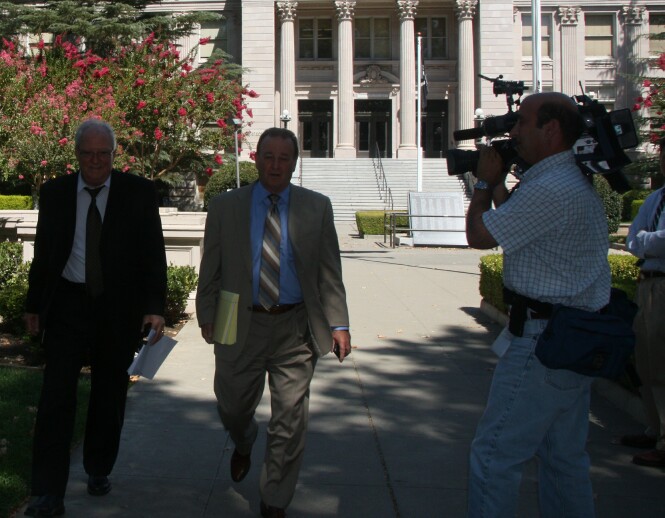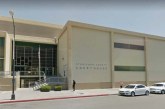 In arguing for the admissibility of Deputy Tony Diaz’ photo when he was alive, the people, led by Deputy DA Garrett Hamilton and DA Jeff Reisig, characterized this case as “not a close case” in their view. The defense took exception to that.
In arguing for the admissibility of Deputy Tony Diaz’ photo when he was alive, the people, led by Deputy DA Garrett Hamilton and DA Jeff Reisig, characterized this case as “not a close case” in their view. The defense took exception to that.
But given that, the prosecution seems oddly panicked by what they term a change in strategy by the defense.
Writes the prosecution on the change of strategy, “On August 4, 2011, after this trial had already begun, and after a new attorney had replaced Mr. Purtell, the People were prejudiced and surprised to learn that the Defense had changed its previous representations regarding guilt phase witnesses.”
They continued, “Specifically, it was discovered that the Defense now intends to call numerous mental health professionals to testify in the guilt phase that the Defendant suffered from mental disorders that prevented him from forming the requisite intent for the crime of first degree murder.”
Based on this, the prosecution has attempted to introduce DNA evidence connecting Mr. Topete to the murder weapon, and to introduce a video of his confession.
It is not clear what relevance the DNA evidence would have to the new strategy anyway. It is certainly the prosecution’s prerogative as to how to put on their case, however, the past week has revealed them to be uncharacteristically sloppy in their attempts to discover later evidence.
From the beginning of this case, we have questioned their strategy of over-emphasizing the gang ties to make this a gang case, when the most clear-cut case is that Mr. Topete appeared to have violated his parole and in the panic, fled and then shot and killed Deputy Diaz.
Not satisfied with that theory, however, the prosecution has introduced the gang theory, that Mr. Topete, with his daughter in tow on father’s day, was trying to put in work for his gang by setting up, lying in wait, and killing Deputy Diaz.
The prosecution even attempted to put on flimsy and highly speculative evidence that Mr. Topete was not actually drunk when he took Mr. Diaz on the high-speed chase that would ultimately end the deputy’s life. This, despite the testimony of Mrs. Topete that when her husband picked her up from her job in Vacaville, he was so drunk that he was passed out at the wheel, and drove extremely slowly just two hours before the fatal confrontation.
If the prosecution was reaching at that, they got downright sloppy last week.
After the trial had already begun, three years after the event, the DA tested DNA on the weapon and in so doing, destroyed the sample, meaning that the defense has no ability to independently test, verify or impeach the evidence.
In his motion, Defense Attorney Dwight Samuel said, “By digesting all the DNA matter contained on the subject swabs, the people have deprived defendant of due process in that it is now impossible for defendant to have any of the swabs independently tested. Further, testing all swabs for DNA without notification to the defendant of such testing so that the defense could send an expert to observe the consumptive testing of the swabs deprived defendant of due process in that defense is now unable to verify the procedures of the testing process.”
Moreover, not only was the DA patently unfair, as Judge Richardson called it, but they were sloppy.
In a second and separate motion, Mr. Samuel argued that the DA has indicated that he intends to use the DNA testing results, “despite the fact that the DOJ has indicated that the test results cannot be interpreted and given any statistical significance, therefore defendant makes [a] motion [that] includes such DNA testing results.”
According to the second motion, on August 24, 2011, the Yolo County Sheriff s Department submitted multiple swabs of various sites from the AR -15, live cartridges and magazine in question.
The test results, according to Mr. Samuel, were inconclusive and the report of August 31, 2011 reflected that the results of DNA testing showed a “low level DNA mixture of at least three individuals, including at least one male …. Due to the complexity of this mixture, no further interpretation will be made.”
DA Jeff Reisig would counter in court that the destruction of DNA during testing is “common.”
Judge Richardson granted the defense’s motion to exclude the DNA evidence during the trial.
“If all the samples were consumed, why wasn’t there notification to the other side to have a defense expert present [during testing]? It does put the defense at a real disadvantage. … It’s a question of fairness,” the judge ruled.
The bottom line here is that while the DA was unfair in the timing and manner of the evidence, the evidence itself had, at best, questionable value. Why would the change of strategy necessitate such a tactic?
From that standpoint, the DA’s insistence on including a confession makes a lot more sense.
The prosecution claims that on June 16, 2008, “Defendant Marco Topete gave a statement to law enforcement officials in which he confessed to committing the shooting in this case.”
In a separate motion, the prosecution writes that Mr. Topete claims that “the Miranda advisement was defective because the defendant did not explicitly or impliedly waive his rights.”
They add, “He does not explain how his advisement was ‘defective.’ On the issue of the initial, pre-interrogation waiver, he claims that he merely indicated he understood his rights, he did not waive them. He then states that he invoked at least six times.”
The DA makes a strong case that the defendant’s statement should be admissible.
“The question whether a suspect has waived the right to counsel with sufficient clarity prior to the commencement of interrogation is a separate inquiry from the question whether, subsequent to a valid waiver, he or she effectively has invoked the right to counsel,” the prosecution argues.
“Far from being coerced or controlled, Topete set the rules for his discussion with the police. He firmly avoided answering questions relating to the crime, but was clearly willing to talk to police and answer other questions,” the brief argues.
The prosecution is claiming that Mr. Topete was only “selectively” waiving his right to remain silent, “so that he may have answered some questions but not answered others.” According to Mr. Topete, “Each time he would refuse to answer specific questions, it should have been taken to mean an invocation that was violated and any subsequent statements should be excluded.”
However, the prosecution argues that such a “selective waiver” is not law in California.
We do not have the defense’s countermotion to weigh against these claims, but what we do have is common sense and deductive reasoning.
Why would the prosecution not simply have tried to introduce evidence of a confession from the start? After all, that would not only play well at 6 pm but would play well to the jury. Unless of course they had a reason to believe it would probably not be admissible and therefore, in a “not close case,” not worth their effort.
Suddenly this case appears perhaps less than “not close,” and the prosecution appears to be attempting to introduce evidence – evidence it knew it had from the start – late in the process.
The part about the DA refusing to hand over the video confession to the judge made for good news coverage last week, including in the Vanguard, but the real issue, while speculative, suggests that the DA is less convinced of its upper hand than it was before.
The direct evidence at this point, assuming they do not get to admit the confession, is a bit more thin than they would like. But the defense would have to introduce a theory that someone other than Mr. Topete fired the weapon.
It is not an impossible theory, but it is extremely improbable – although no one saw Mr. Topete shoot the deputy. Moreover, while Mr. Topete’s thumbprint was on the weapon, there were other prints that may have belonged to others. Likewise, the DNA evidence is inconclusive.
Despite these factors of reasonable doubt, the fact remains that it was Mr. Topete’s car that he was seen driving as recently as two hours before, his baby was in the back, and it was he who hid in the field to be captured by police.
That remains a convictable case, unless they can prove another shooter.
The real question is what psychological evidence does the defense have to mitigate enough intent to get Mr. Topete to avoid special circumstances and a death sentence?
Normally, we would say it would not matter anyway, Mr. Topete, an unsympathetic individual, shot and killed a law enforcement officer. And we still believe that, but the DA’s tactics in the last week give us at least a small amount of pause.
—David M. Greenwald reporting





[quote][b][i]”…People Seem Oddly Panicked in Topete”[/i][/b][/quote]In all this rehash, I’m unable to see any panic on the DA’s part. Please enlighten.
[quote]“…People Seem Oddly Panicked in Topete”
In all this rehash, I’m unable to see any panic on the DA’s part. Please enlighten. [/quote]
I was just going to say…
Ditto…
Rather than have a full article, the update is that Judge Richardson will allowed this to go forward from a limited standpoint. Judge Richardson ruled that Mr. Topete repeatedly refused to answer certain questions but not others. Because he continued talking with investigators, Judge Richardson ruled, Mr. Topete did not “effectively” invoke his right to remain silent.
He said that Mr. Topete waived his right to remain silent and did not invoke those rights at a later point in time. He also determined that Mr. Topete’s statement was made voluntarily and not coerced.
The Judge ruled that the confession could be used to introduce evidence of Mr. Topete’s criminal and gang sophistication.
“In all this rehash, I’m unable to see any panic on the DA’s part. Please enlighten. “
I don’t see a good reason to try to sloppily put on last minute evidence based on what they call a trial strategy shift. If you prefer sloppy rather than panicked, fine.
[quote]I don’t see a good reason to try to sloppily put on last minute evidence based on what they call a trial strategy shift. If you prefer sloppy rather than panicked, fine.[/quote]
Sigh… the defense makes a sudden shift, the prosecution must think quickly and do what it can to counter immediately. But bc they don’t achieve perfection in your view, they are somehow “sloppy”/”panicked”. But the defense suddenly coming up with a new strategy to throw the prosecution off balance was of course benign/clever. Had the prosecution done the same sort of thing it would have been considered by the Vanguard as sandbagging/improper/dispicable. This is the nature of trial work – it is much like a super fast chess game – one side makes a move, the other side counters. But unlike normal chess, the moves must be made at lightening fast speed at times, without much time to think. Missteps are almost inevitable…
“the defense makes a sudden shift, the prosecution must think quickly and do what it can to counter immediately.”
Assuming that the defense made a sudden shift, the prosecution might want to counter. However, some of the evidence that they attempted to introduce had nothing to do with what they claimed they were trying to counter. How does DNA evidence on the weapon counter psychological evidence? It was discovered late, it was destroyed, the DA didn’t do it properly. Moreover the evidence was of questionable value. So taking all that into account, I find your response perplexing. It’s almost as though you are simply responding to a single word without reading the rest of the article.
Try juggling 8 or 10 balls in the air at the same time… see if you don’t drop one occasionally…
They had three years to prepare their case, they shouldn’t have to juggle. This was an open and shut case.
[quote]They had three years to prepare their case, they shouldn’t have to juggle. This was an open and shut case. And ambushing the defense with evidence is not a mere mistake. You’re trying to defend something that’s really not defensible.[/quote]
Sigh… trial work is a high pressure protracted and grueling endeavor. Sorry we’ll have to agree to disagree on this one…